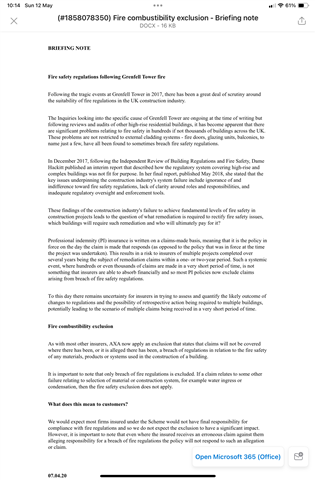This morning I had at look at my renewal quote for my Electrical Contractors combined insurances policy.
Attached is a briefing note from the insurance company, regarding a Fire Combustibility Exclusion Clause. Any thoughts?

This morning I had at look at my renewal quote for my Electrical Contractors combined insurances policy.
Attached is a briefing note from the insurance company, regarding a Fire Combustibility Exclusion Clause. Any thoughts?

Regards it being the clients responsibility to appoint a fire risk assessor, here is a comment in an IET Wiring Matters article about the BS7671 corrigendum issued last year and escape routes:
It is important to note that the fire strategy and fire engineering requirements are the responsibility of a fire engineer. It is not the job for an electrician to determine which areas are considered protected escape routes or not. Professional advice from a fire engineer should be sought.
Presumably, unless they can get insurance, very few will be happy to step into a fire risk assessor/advisor role if it means carrying the can for omissions in a design/ construction of something you cannot see in totality - which may be the case for most projects on existing buildings. Which may risk leaving only the cowboy types in operation.
I also wonder where it leaves the £50 drive-by EICR. Should fire stops be checked at the same time ?
Mike
To stop the £50 drive by EICR the HSE need to start to prosecute offenders of false EICRs. CPS (Competent Person Schemes) need to make their members aware that they should report suspected EICR breaches.
As always there are many caveats but the 2 biggest are
1) The need for 1 governing body for Electric contractors/employees
2 Who pay for this
2 Who pay for this
Always the consumer
Indeed - perhaps meaning that at the shallow end it does not happen properly or in some cases at all - roughly where we are now of course. At some point things are not worth doing. In the limit if it is expensive enough you could decide not to bother with electricity at all,though we are long way from that in the UK, and in places where there is not the money the work is much rougher (thinking places like Africa and South America).
Mike.
What about using OpenAI / Chat GPT 4 (other brands are available) to do the risk assessment? I think that would make for a very interesting experiment. Can AI read the room and spot the issues a human can?
Could a AI generated Risk assessment beat a AI generated Fire Combustibility Exclusion Clause?
Would AI need insurance?
What about using OpenAI / Chat GPT 4 (other brands are available) to do the risk assessment? I think that would make for a very interesting experiment. Can AI read the room and spot the issues a human can?
Could a AI generated Risk assessment beat a AI generated Fire Combustibility Exclusion Clause?
Would AI need insurance?
Could a AI generated Risk assessment beat a AI generated Fire Combustibility Exclusion Clause?
That's a truly frightening thought - how (and who) would you train the AI system ?
I'm not a great believer in adding to paperwork that no one reads.
Mike
We're about to take you to the IET registration website. Don't worry though, you'll be sent straight back to the community after completing the registration.
Continue to the IET registration site